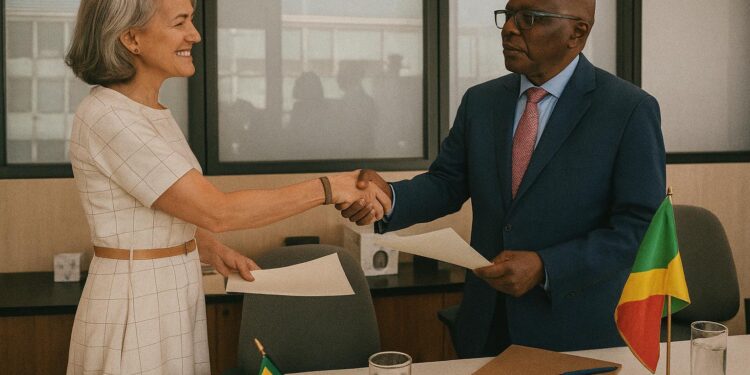A Signature That Reverberates in Brasília and Brazzaville
When Ambassador Louis Sylvain-Goma and Finance Ministry attorney Sônia de Almendra F. Portella Nunes exchanged pens inside Brazil’s Treasury headquarters on 22 July, they were not merely updating paperwork. They were consummating the first amendment to the 2014 bilateral debt-rescheduling agreement, a document that had weathered nearly a decade of commodity swings and pandemic disruptions. The joint endorsement, already cleared by the Brazilian Senate and the Congolese Parliament, inserts a new interest benchmark—Term SOFR—in place of the now-defunct LIBOR, ensuring contractual certainty and market relevance.
Why a Benchmark Matters in South-South Finance
LIBOR’s retirement, officially sealed at end-2021 after manipulation scandals, forced sovereigns worldwide to revisit legacy contracts. For Congo-Brazzaville, whose external debt reached 98 percent of GDP at the height of the 2020 oil slump (IMF 2023), the technical substitution was anything but cosmetic. SOFR, anchored in overnight repurchase transactions and published by Bloomberg, offers lower volatility and enhanced transparency, shielding Brazzaville from unexpected spikes while giving Brasília comfort that repayment flows remain benchmarked to a globally accepted rate.
Calibrating the Fiscal Compass in Brazzaville
The Congolese Treasury views the amendment as a building block for a broader debt-management strategy that already includes an Extended Credit Facility with the IMF and bilateral discussions with China and private bondholders. Officials in Brazzaville underscore that the SOFR alignment dovetails with President Denis Sassou Nguesso’s pledge to restore debt sustainability through gradual fiscal consolidation rather than abrupt austerity. Early simulations by the Ministry of Finance suggest that replacing LIBOR with SOFR could trim servicing costs by up to 40 basis points annually, a modest but symbolically potent relief for the 2024–2026 budget cycle.
Brasília’s Renewed Appetite for the Global South
For President Luiz Inácio Lula da Silva, who returned to power on a platform of reviving Brazil’s international activism, the amendment reinforces the country’s standing as a pragmatic partner in Africa. Brazilian officials note that total Congolese obligations remain relatively small—under US $500 million—but the relationship offers a test case for rules-based, solidarity-driven finance, contrasting with perceptions of extractive lending by extra-regional actors. The forthcoming second amendment under Senate review, designed to reduce the nominal stock of Congo’s debt to Brazil, aligns with Brasília’s South-South Cooperation Strategy released in May 2023.
Echoes of Four Decades of Bilateral Engagement
Diplomatic ties, inaugurated in 1980 and institutionalised through a 1981 cooperation accord, have witnessed cycles of intensity. President Sassou Nguesso’s three state visits to Brazil—in 1982, 2005 and at the 2023 Amazon Cooperation Treaty summit—bookend chapters of political rapport that survived regime changes in both countries. Lula’s own 2007 journey to Brazzaville resulted in agreements on agriculture and defence that remain operational. Analysts at the Pontifical Catholic University of Rio observe that debt diplomacy is now the most visible thread of that tapestry, offering fiscal oxygen to Congo while providing Brazil with diplomatic capital across Francophone Africa.
Looking Ahead: From Amendment to Opportunity
Negotiators on both sides speak of the 22 July signing as an inflection rather than a conclusion. Beyond the pending second amendment, discussions are advancing on lines of credit for renewable-energy projects in Pointe-Noire and vocational-training exchanges in agrotechnology. The Brazilian Development Bank is reported to be studying a partial guarantee mechanism that could crowd in private co-lenders, a model inspired by Lula’s earlier South-South ventures. For Brazzaville, such initiatives dovetail with its National Development Plan, which prioritises diversification away from hydrocarbon dependence.
Financial markets greeted the news with measured approval: Congo’s Eurobonds tightened by eight basis points in the week following the announcement, a marginal move yet indicative of investor recognition that contractual modernisation reduces legal ambiguity. In the words of an Abidjan-based sovereign-risk analyst, “The switch to SOFR may seem mundane, but in the realm of distressed-debt pricing, predictability is premium.”
A Pragmatic Case Study in Cooperative Sovereignty
The Congo-Brazil amendment exemplifies how middle-income creditors and resource-dependent borrowers can recalibrate legacy contracts without acrimony, thereby fortifying a rules-based international financial order. It also illustrates that, despite global headwinds, South-South partnerships retain agility and political resonance. As both capitals prepare for the next round of talks, diplomats are quick to stress that the substance transcends symbolism: credible, transparent and mutually beneficial financial arrangements remain essential building blocks for stability in the Gulf of Guinea and beyond.












































